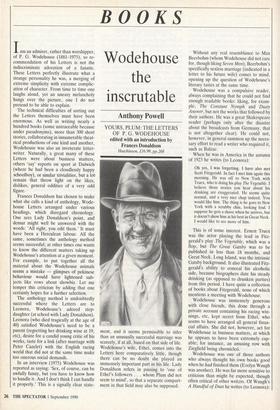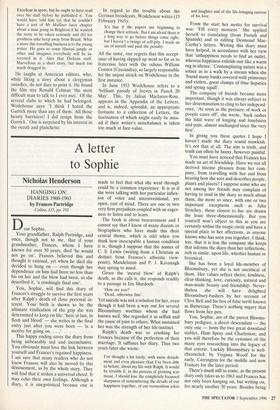BOOKS
Wodehouse the inscrutable
Anthony Powell
YOURS, PLUM: THE LETTERS OF P. G. WODEHOUSE edited with an introduction by Frances Donaldson
Hutchinson, £16.99, pp.268
Iam an admirer, rather than worshipper, of P. G. Wodehouse (1881-1975), so re- commendation of his Letters is not the indiscriminate adoration of a fanatic.
These Letters perfectly illustrate what a strange personality he was, a merging of extreme simplicity with extreme complic- ation of character. From time to time one laughs aloud, yet an uneasy melancholy hangs over the picture, one I do not pretend to be able to explain.
The technical difficulties of sorting out the Letters themselves must have been enormous. As well as writing nearly a hundred books (some untraceable because under pseudonyms), more than 300 short stories, collaborating in innumerable theat- rical productions of one kind and another, Wodehouse was also an inveterate letter-
writer. Naturally, a great many of these Letters were about business matters, others 'say' reports on sport at Dulwich (where he had been a cloudlessly happy schoolboy), or similar trivialities, but a lot, remain that throw light on the likes, dislikes, general oddities of a very odd figure.
Frances Donaldson has chosen to make what she calls a kind of anthology, Wode- house Letters arranged under various headings, which disregard chronology. One sees Lady Donaldson's point, and demur might well be answered with the words: 'All right, you edit them.' It must have been a Herculean labour. All the same, sometimes the anthology method seems successful; at other times one wants to know the different matters taking up Wodehouse's attention at a given moment.
For example, to put together all the material about the Wodehouse animals seems a mistake — glimpses of pekinese behaviour would have lightened sub- jects like rows about showbiz. Let me temper this criticism by adding that one certainly hopes for a further selection.
The anthology method is undoubtedly successful where the Letters are to Leonora, Wodehouse's adored step- daughter (at school with Lady Donaldson).
Leonora (who died tragically at the age of 40) satisfied Wodehouse's need to be a parent (regretting her drinking wine at 19, etc), desire for a candid young critic of his works, taste for a link (after marriage with Peter Cazelet) with the English racing world that did not at the same time make too onerous social demands.
In an interview (1975) Wodehouse was reported as saying: 'Sex, of course, can be awfully funny, but you have to know how to handle it. And I don't think I can handle it properly.' This is a signally clear state- ment, and it seems permissible to infer than an unusually successful marriage was scarcely, if at all, based on that side of life. Wodehouse's wife, Ethel, comes into the Letters here comparatively little, though there can be no doubt she played an immensely important part in his life. Lady Donaldson refers in passing to 'one of Ethel's followers . . . whom Plum did not seem to mind', so that a separate compart- ment in that field may also be supposed. Without any real resemblance to Max Beerbohm (whom Wodehouse did not care for, though liking Seven Men), Beerbohm's specifically sexless marriage (indicated in a letter to his future wife) comes to mind, opening up the question of Wodehouse's literary tastes at the same time.
Wodehouse was a compulsive reader, always complaining that he could not find enough readable books: liking, for exam- ple, The Constant Nymph and Dusty Answer, but not the works that followed by their authors. He was a great Shakespeare reader (perhaps only after the disaster about the broadcasts from Germany, that is not altogether clear). He could not, however, in general summon up the neces- sary effort to read a writer who required it, such as Balzac.
When he was in America in the autumn of 1923 he writes (to Leonora):
Oh yes, I was forgetting. I have also met Scott Fitzgerald. In fact I met him again this morning. He was off to New York with Truex, who is doing his play The Vegetable. I believe those stories you hear about his drinking are exaggerated. He seems quite normal, and a very nice chap indeed. You would like him. The thing is he goes to New York with a scrubby chin, looking foul. I suppose he gets a shave when he arrives, but it doesn't show him at his best in Great Neck. I would like to see more of him.
This is of some interest. Ernest Truex was the actor playing the lead in Fitz- gerald's play The Vegetable, which was a flop, but The Great Gatsby was to be published in less than 18 months, and Great Neck, Long Island, was the intrinsic Gatsby background. It also illustrated Fitz- gerald's ability to conceal his alcoholic side, because biographers date his steady drinking (as opposed to drunken parties) from this period. I have quite a collection of books about Fitzgerald, none of which mentions a meeting with Wodehouse.
Wodehouse was immensely generous with close friends, this done through a private account containing his racing win- nings, etc, kept secret from Ethel, who seems to have arranged all general finan- cial affairs. She did not, however, act for Wodehouse in business matters, at which he appears to have been extremely cap- able; for instance, an amusing row with Ziegfield being chronicled.
Wodehouse was one of those authors who always thought his own books good when he had finished them (Evelyn Waugh was another). He was far more sensitive to criticism than might he expected, though often critical of other writers. Of Waugh's A Handful of Dust he writes (to Leonora): Excellent in spots, but he ought to have read over his stuff before he published it. You would have told him (a) that he couldn't have a sort of Mr Mulliner farce chapter about a man going to Brighton if he wanted the story to be taken seriously and (b) for goodness sake keep away from Brazil. What a snare this travelling business is to the young writer. He goes to some blasted jungle or other and imagines everybody will be in- terested in it. Also that Dickens stuff. Marvellous as a short story, but much too much dragged in.
He laughs at American editors, who, while liking a story about a clergyman swindler, do not dare to print it. He found the film star Ronald Colman 'the most difficult man to talk to I ever met.' Of the several clubs to which he had belonged, Wodehouse says: 'I think I hated the Garrick more than any of them. All those hearty barristers! I did resign from the Garrick.' One is surprised by his interest in the occult and planchette. In regard to the trouble about the German broadcasts, Wodehouse writes (15 February 1945): It's fine if the papers are beginning to change their attitude. But I am afraid there is a long way to go before things come right, but I haven't a twinge of self-pity. I made an ass of myself and paid the penalty.
All the same, one regrets that this accept- ance of having slipped up went so far as to fraternise later with the odious William Connor (Cassandra), so largely responsible for the unjust attack on Wodehouse in the first instance.
In June 1953 Wodehouse refers to a 'brilliant parody of Jeeves in Punch 20 May'. This, by Julian Maclaren-Ross, appears in the Appendix of the Letters, and is, indeed, splendid, an appropriate footnote to a collection of Letters, the fascination of which might easily be miss- ed if their writer's nonchalance is taken too much at face-value.



















































 Previous page
Previous page